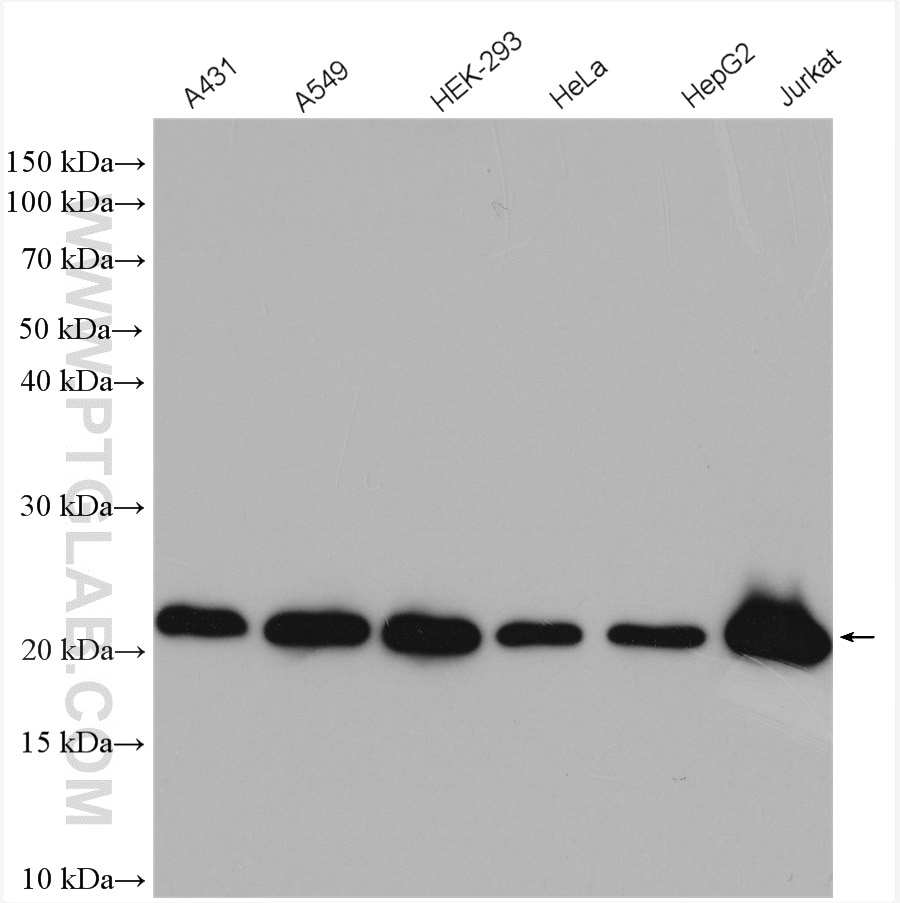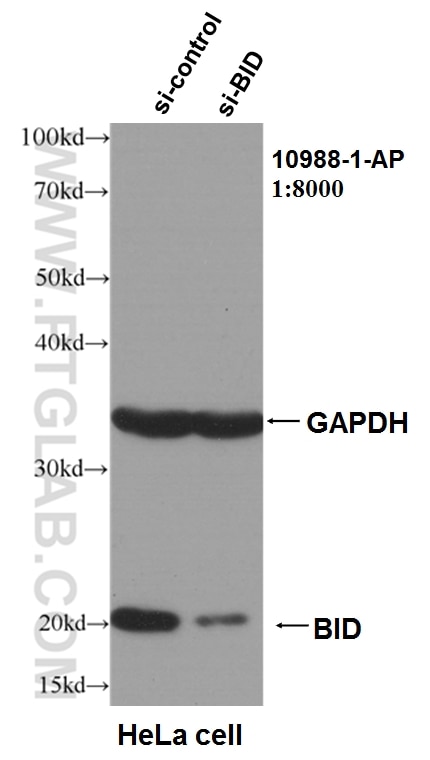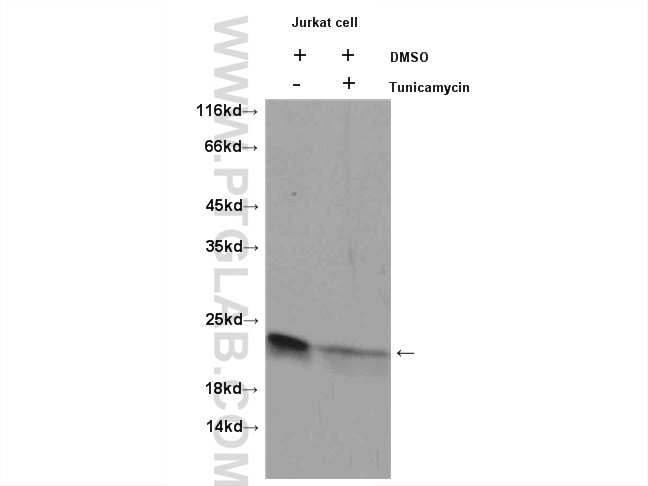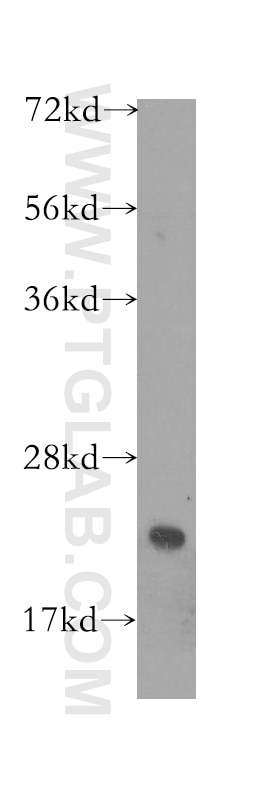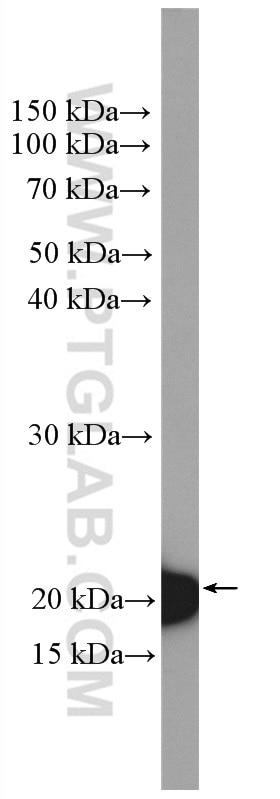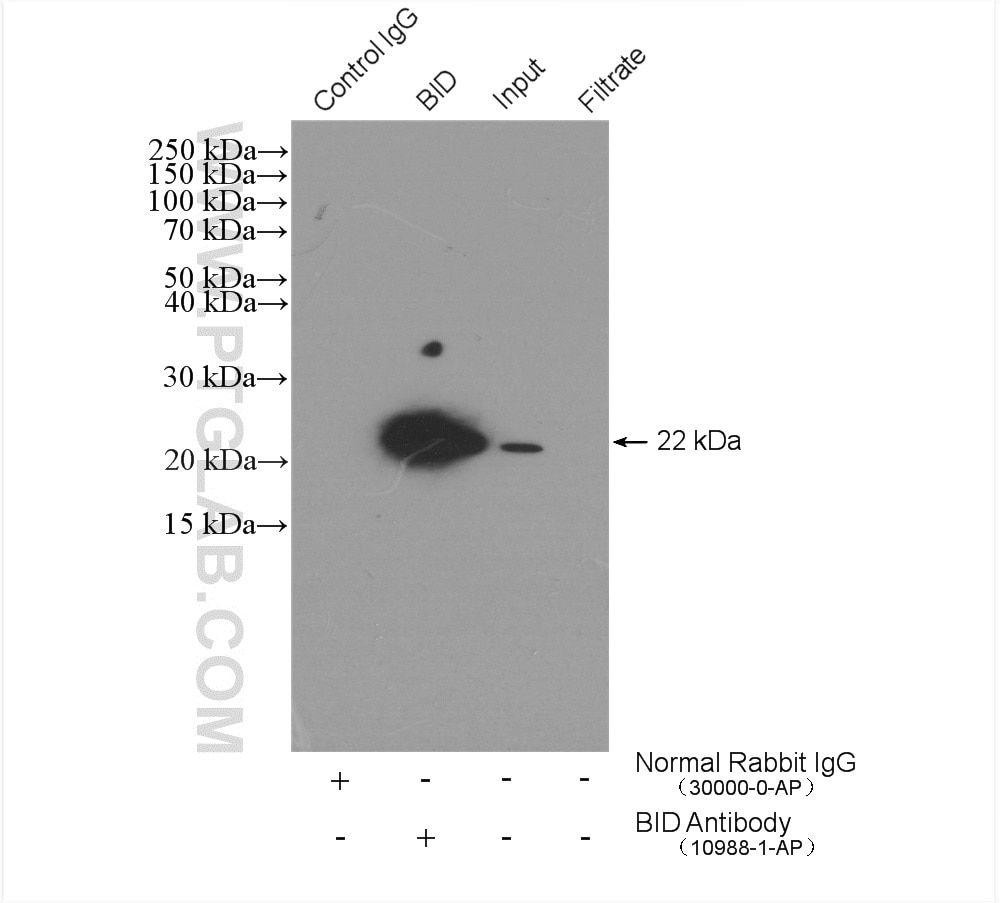Tested Applications
| Positive WB detected in | A431 cells, human brain tissue, Tunicamycin treated HeLa cells, A549 cells, HEK-293 cells, HepG2 cells, Jurkat cells |
| Positive IP detected in | HeLa cells |
Recommended dilution
| Application | Dilution |
|---|---|
| Western Blot (WB) | WB : 1:1000-1:4000 |
| Immunoprecipitation (IP) | IP : 0.5-4.0 ug for 1.0-3.0 mg of total protein lysate |
| It is recommended that this reagent should be titrated in each testing system to obtain optimal results. | |
| Sample-dependent, Check data in validation data gallery. | |
Published Applications
| WB | See 60 publications below |
| IHC | See 3 publications below |
| IF | See 1 publications below |
Product Information
10988-1-AP targets BID in WB, IHC, IF, IP, ELISA applications and shows reactivity with human samples.
| Tested Reactivity | human |
| Cited Reactivity | human, mouse, rat, pig |
| Host / Isotype | Rabbit / IgG |
| Class | Polyclonal |
| Type | Antibody |
| Immunogen |
CatNo: Ag1445 Product name: Recombinant human BID protein Source: e coli.-derived, PGEX-4T Tag: GST Domain: 1-195 aa of BC009197 Sequence: MDCEVNNGSSLRDECITNLLVFGFLQSCSDNSFRRELDALGHELPVLAPQWEGYDELQTDGNRSSHSRLGRIEADSESQEDIIRNIARHLAQVGDSMDRSIPPGLVNGLALQLRNTSRSEEDRNRDLATALEQLLQAYPRDMEKEKTMLVLALLLAKKVASHTPSLLRDVFHTTVNFINQNLRTYVRSLARNGMD Predict reactive species |
| Full Name | BH3 interacting domain death agonist |
| Calculated Molecular Weight | 22 kDa |
| Observed Molecular Weight | 22 kDa |
| GenBank Accession Number | BC009197 |
| Gene Symbol | BID |
| Gene ID (NCBI) | 637 |
| RRID | AB_2065624 |
| Conjugate | Unconjugated |
| Form | Liquid |
| Purification Method | Antigen affinity purification |
| UNIPROT ID | P55957 |
| Storage Buffer | PBS with 0.02% sodium azide and 50% glycerol, pH 7.3. |
| Storage Conditions | Store at -20°C. Stable for one year after shipment. Aliquoting is unnecessary for -20oC storage. 20ul sizes contain 0.1% BSA. |
Background Information
BID, also named as p22 BID, can be cleaved into p11 BID, p13 BID and p15 BID. It is pro-apoptotic molecules. The major proteolytic product p15 BID allows the release of cytochrome c. BID-L, BID-EL and BID-ES induce ICE-like proteases and apoptosis. BID-S does not induce apoptosis. BID counters the protective effect of Bcl-2. (PMID:14583606)
Protocols
| Product Specific Protocols | |
|---|---|
| IP protocol for BID antibody 10988-1-AP | Download protocol |
| WB protocol for BID antibody 10988-1-AP | Download protocol |
| Standard Protocols | |
|---|---|
| Click here to view our Standard Protocols |
Publications
| Species | Application | Title |
|---|---|---|
Bioact Mater A ROS-responsive, self-immolative and self-reporting hydrogen sulfide donor with multiple biological activities for the treatment of myocardial infarction. | ||
Environ Pollut Silica nanoparticles inducing the apoptosis via microRNA-450b-3p targeting MTCH2 in mice and spermatocyte cell. | ||
Cell Mol Life Sci Clostridioides difficile toxin B alone and with pro-inflammatory cytokines induces apoptosis in enteric glial cells by activating three different signalling pathways mediated by caspases, calpains and cathepsin B. | ||
Int J Cancer Tetrandrine induces apoptosis by activating reactive oxygen species and repressing Akt activity in human hepatocellular carcinoma. | ||
Free Radic Biol Med Shikonin, a Chinese plant-derived naphthoquinone, induces apoptosis in hepatocellular carcinoma cells through reactive oxygen species: A potential new treatment for hepatocellular carcinoma. | ||
Stem Cell Res Ther Adipose-derived stem cells alleviate radiation-induced dermatitis by suppressing apoptosis and downregulating cathepsin F expression. |

